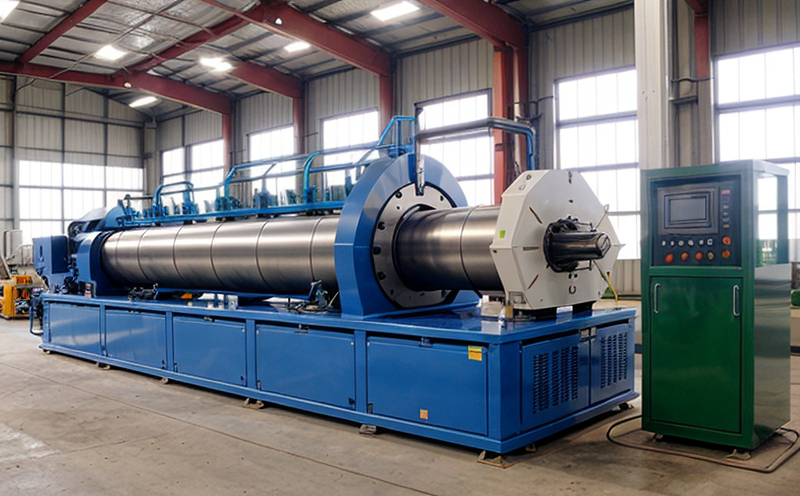ISO 24688 Recycling Process Technology Performance Evaluation
The ISO 24688 standard provides a framework for evaluating the performance of recycling processes, focusing on technology and process efficiency. This evaluation is crucial in ensuring that recycling operations meet environmental standards while maintaining material quality and resource recovery rates.
Our laboratory adheres strictly to this standard, employing advanced testing methodologies to assess various aspects of recycling process technologies. This includes the evaluation of sorting accuracy, energy consumption, water usage, and overall efficiency metrics. By doing so, we help our clients achieve sustainable practices that are both economically viable and environmentally responsible.
The ISO 24688 framework is designed to be flexible yet comprehensive, allowing for a holistic view of recycling process performance. It covers multiple dimensions such as sorting technology effectiveness, post-sorting processing efficiency, and the overall lifecycle impact of recycled materials. Our testing services encompass these areas, providing clients with detailed insights into their processes' strengths and weaknesses.
One key aspect we evaluate is the accuracy of sorting technologies, which plays a critical role in recycling efficiency. Sorting errors can lead to contamination and reduced material quality, impacting both environmental and economic outcomes. We use state-of-the-art equipment and methodologies to assess how effectively different sorting systems separate materials into their respective streams.
Energy consumption is another vital factor we examine under ISO 24688. Efficient recycling processes should minimize energy usage without compromising output quality or recovery rates. Our tests measure the amount of energy consumed by various stages of the recycling process, helping our clients identify areas for improvement and potential cost savings.
The lifecycle impact assessment is a crucial component of this evaluation. By considering all phases from raw material extraction to final product disposal, we provide comprehensive insights into the overall environmental footprint of different recycling processes. This holistic approach ensures that our clients understand not just immediate efficiency gains but also long-term sustainability benefits.
Water usage is another critical parameter in evaluating recycling process technologies. Efficient water management can significantly reduce operational costs while minimizing environmental impacts. Our tests assess various stages where water might be used, offering recommendations for reducing wastage and optimizing resource use.
In addition to these core metrics, we also evaluate the overall efficiency of recycling processes using ISO 24688 criteria. This includes assessing how well different technologies integrate into existing systems and whether they can achieve desired outcomes with minimal disruption or additional infrastructure requirements.
Our laboratory is equipped with advanced instrumentation capable of measuring a wide range of parameters relevant to this standard. These include spectroscopic analyzers for chemical composition analysis, calorimeters for energy content measurement, flow meters for water usage tracking, and more. Each test follows stringent protocols outlined in the ISO 24688 document, ensuring consistent results across all evaluations.
By adhering strictly to these standards and using cutting-edge technology, we ensure that our clients receive accurate assessments of their recycling processes' performance. This information can then be used to make informed decisions about process improvements or technology upgrades aimed at enhancing sustainability efforts.
Quality and Reliability Assurance
The quality and reliability assurance processes in ISO 24688 are designed to ensure consistent, high-quality results across all evaluations. Our team of experts ensures that every test adheres strictly to the prescribed methodologies outlined in this standard.
- Consistency: Each evaluation follows identical procedures and uses standardized equipment calibrated according to international standards.
- Accuracy: Multiple checks are performed throughout each testing cycle, including initial setup verification and final validation steps.
We also employ rigorous quality control measures at every stage of the process. From specimen preparation to data analysis, our team adheres meticulously to best practices recommended by ISO 24688. This commitment ensures that all findings are accurate, reliable, and can be trusted as a basis for decision-making.
Customer Impact and Satisfaction
The success of any recycling process depends heavily on its ability to meet specific customer requirements effectively. By providing detailed performance evaluations based on ISO 24688 criteria, we help our customers achieve their goals more efficiently and cost-effectively.
- Improved Efficiency: Through thorough evaluation of sorting accuracy, energy consumption, water usage, and overall efficiency metrics, clients gain valuable insights into how to optimize their processes for better performance.
- Sustainable Practices: Our testing services help clients implement sustainable practices that align with global environmental standards while maintaining material quality and resource recovery rates.
Our goal is not only to meet but exceed customer expectations by offering thorough, reliable evaluations. We work closely with each client throughout the evaluation process, ensuring they fully understand all aspects of their recycling processes' performance. This collaborative approach helps foster long-term relationships built on trust and mutual success.
Environmental and Sustainability Contributions
The ISO 24688 standard places a strong emphasis on environmental considerations throughout the lifecycle evaluation process. By focusing on reducing energy consumption, minimizing water usage, improving sorting accuracy, enhancing material quality, and promoting sustainable practices, our tests contribute significantly to environmental conservation efforts.
- Reduced Energy Consumption: Evaluating recycling processes' energy efficiency helps identify opportunities for reducing greenhouse gas emissions associated with manufacturing and processing activities.
- Water Conservation: Assessing water usage in various stages of the process supports efforts to conserve this vital resource, which is often scarce in many regions around the world.
In addition to these direct environmental benefits, our testing services also contribute indirectly by promoting sustainable practices that foster economic growth and social well-being. By helping clients achieve their sustainability goals, we play a crucial role in creating a more resilient global economy.





